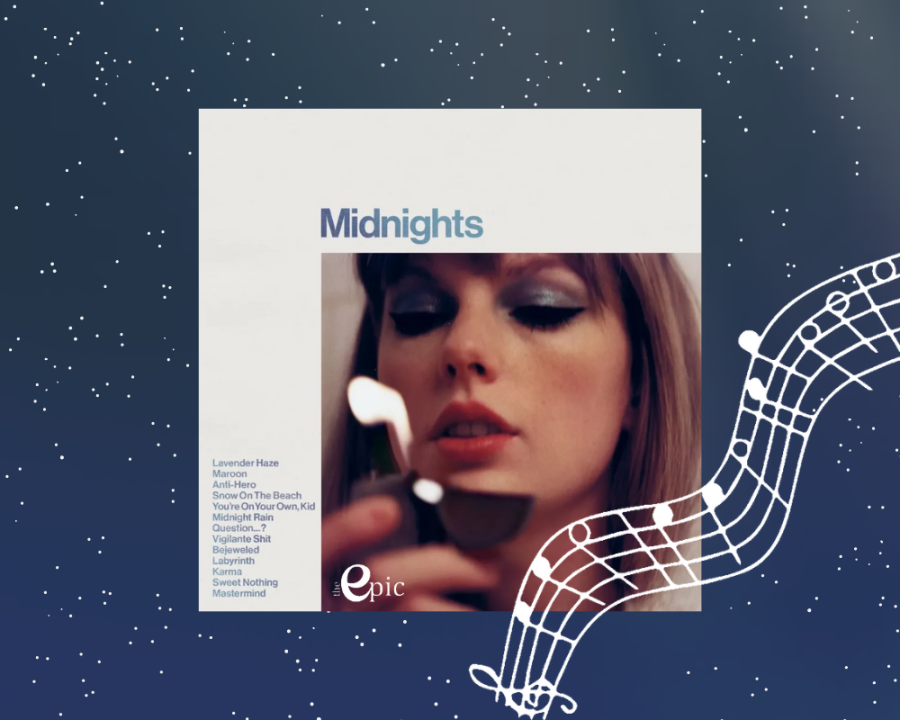Midnights: Lost in a labyrinth of the past
Graphic illustration by Eileen Zhu.
Taylor Swift’s latest album, “Midnights,” has become an immediate hit, yet echoes the style of her previous titles.
November 7, 2022
Described as “13 sleepless nights” throughout her life, Taylor Swift’s 10th studio album “Midnights” takes listeners on a rollercoaster of emotions. Swift’s journey of re-recording her older albums seems to have influenced “Midnights,” which strongly resembles her past albums. With all-too-familiar catchy love-songs and playful beats weaved throughout the album, one has to wonder if Swift has been caught in the past or if “Midnights” carries a distinct identity of its own.
On Aug. 28 at the MTV Video Music Awards, Swift announced the release of the album, a pleasant surprise to many fans as Swift had recently spent her time re-recording her older albums such as “Red” and “Fearless.” Prior to the release of the album, it seemed as though the album would delve into the darkest part of the night and the heaviness that it brings. However, once released, the few darker themes discussed in the album — such as self-hatred and overthinking — were overshadowed by audio effects and striking similarities to older songs by Swift. These factors don’t necessarily discredit the album; in fact, it’s enjoyable to listen to for the first few times, but the lack of originality makes the songs easily forgettable.
The album opens with “Lavender Haze,” a song made to mimic the feeling of falling in love, according to Swift. The bubbly and calming melodies, accompanied by Swift’s dream-like vocals, make the listeners feel as though they have been transported onto cloud nine. The song carries the familiar vibe of Swift’s earlier album, “Lover,” to a point where it feels like it belongs there more than it does in “Midnights.” Despite this, the song itself is a fun and energetic opener and sets an interesting scene for the rest of the album.
The third track, “Anti-Hero,” could have been one of the highlights of the album. It moves into darker topics of self-hatred, and listeners start to observe one of the gloomier nights in Swift’s life, commenting on the universal feeling of not living up to societal expectations. Although the song means to convey a deeper message, the beats don’t match the tone, the lyrics feel underwhelming and repeated lines such as “It’s me, hi, I’m the problem” in the chorus become redundant. Swift has always demonstrated her ability to purposefully craft her lyrics in such a way that the message of her songs hits the hearts of listeners. However, “Anti-Hero” is not one of those songs. Perhaps Swift did embed a deeper meaning between the lyrics, but whatever intended meaning is drowned out by the simplistic lyrics and unfitting happy beats.
Swift then takes a vengeful turn in track eight, “Vigilante Shit,” with lines such as “Lately, I’ve been dressin’ for revenge,” leaving a vindictive mark on listeners. Fans have speculated that the song references Scooter Braun and his wife. Braun, who is the main reason for Swift’s recent re-recordings of her older albums, has had a long and controversial history with Swift. In “Vigilante Shit,” Swift sheds light on what happened behind the scenes. This song is one of the album’s standouts, with the lyrics and beats complimenting each other in a way that successfully conveys Swift’s storytelling. The lyrics “I don’t dress for women. I don’t dress for men. Lately I’ve been dressin’ for revenge,” comes across as breaking free from people’s views of how she should present herself, and instead embracing who she is.
“Midnights” concludes with “Mastermind,” a calming and relatable song that talks about the habit of overplanning one’s life while simultaneously putting on a show of effortlessness. Listeners, in turn, feel heard as the lyrics perfectly describe a variety of scenarios. The song serves as the conclusion to the album, leaving listeners craving more.
With the release of “Midnights (3 a.m. version),” fittingly released at 3 a.m., Swift added seven bonus tracks. Among those seven tracks, some songs felt as though they fit the “Midnights” theme better than some songs on the main album. One of the songs, “The Great War,” touches on topics of the trauma left behind by relationships, and Swift’s song-writing cleverly delivers her message in a way that resonates in listeners’ hearts. Similarly, “Bigger Than The Whole Sky” discusses how Swift dealt with her loss of close friend Jeff Lang. The soft melodies and comprehensive lyrics make the song worthy of being in the original album. With the 3 a.m. tracks, the album felt redeemed in a way, but not enough to make up for the entirety of “Midnights.”
In “Midnights,” Swift diverges from her previous works such as “Folklore” and “Evermore.” Swift’s attempt to re-ignite the flame of her older albums in “Midnights” backfires as the songs quickly start to feel repetitive and unoriginal. If the album was not so much of a carbon copy of Swift’s past projects, the playful beats and lyrics of songs such as “Lavender Haze” and the darker songs such as “Vigilante Shit” would’ve easily been much more memorable. However, “Midnights” leaves fans still awaiting for an album that is both unique and retains Swift’s signature charm.




























































